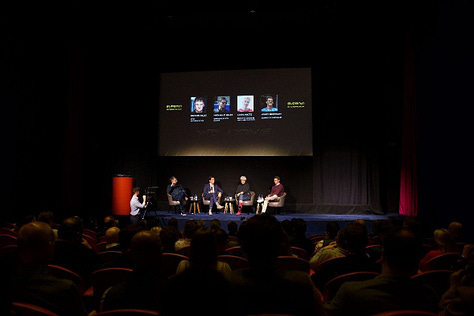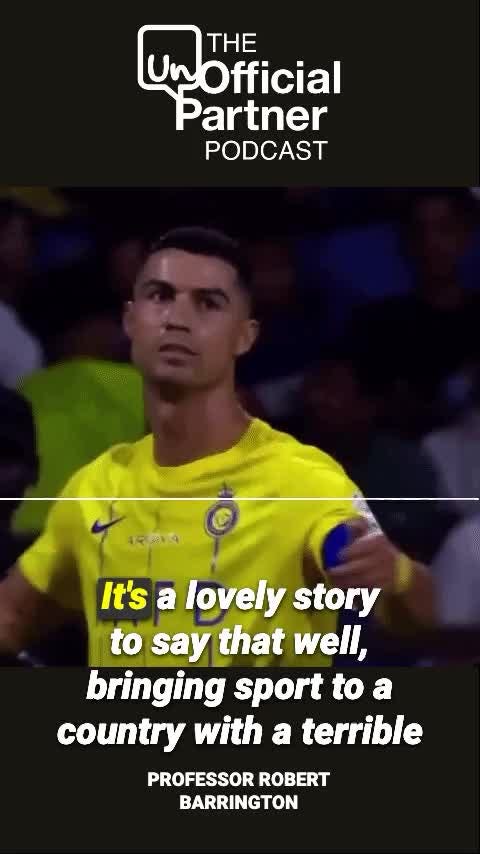The Saudi Question; Infantino's rise; Can PIF do it all; Pinter's Super League; Asleep at the wheel; Sport in 100 Objects; The England Shirt; Why endings matter; Why Tri; UP Country; Admiral's legacy
Overthinking the sports business, for money
This week’s newsletter is sponsored by We Are Sweet, the leading provider of digital platforms for the sports industry.
Is one of your 2024 goals to start engaging a younger audience with a second screen experience?
We Are Sweet excels in crafting best-in-class software, ranging from unique engagement experiences to next-generation websites. With more than a decade of innovating alongside names like IMG, ATP, Professional Triathletes Organisation and Formula 1, you can trust that their software delivers.
Whether you're looking to kickstart your community and transform the way you communicate with professional players, bring data to life in a second-screen experience, or need a website that monetises fans, We Are Sweet is the digital partner you need.
Visit www.wearesweet.co.uk to turn your digital aspirations into tangible success stories.
Where the Saudi Question leads
I’m trying to get beyond the simple binary of for and against.
You’ll have your own starting point, I have mine.
The aim of the series is to push a little further.
Here are some questions and builds that arose from this episode with two experts in politics, global affairs and business ethics, Professors Robert Barrington and Dan Hough.
We’d love further contributions, particularly from people working and living within Saudi.
1. The money as a test of the mission statement
Gianni Infantino got a 30% rise this week.
No doubt he’ll point at Roger Goodell and plead relative poverty.
But it’s a good time to ask, what’s the money for?
Robert Barrington noted the contradictions within FIFA’s strategic document.
So I was actually just looking at FIFA this morning preparation for this chat and FIFA's vision for, what it wants to do in the world. It lays it out in a very attractive way a football pitch with its 11 strategic objectives for the global game 2023 to 2027.
Number six is focus on social responsibilities, in particular human rights and climate related aspects. And number 11 is achieve a minimum 11 billion of revenues as part of a more global administration. So I think what one can see there is that at the governing body level where you would expect this to be sort of, laid out clearly, there is just a massive and inherent contradiction going on.
And that's, simply one sporting body that I looked at slightly at random. I suspect we would find the same in most of the sporting bodies. I looked at tennis as well, which said the Women's Tennis Association, because there's been talk of that going to Saudi and that talked about it being set up in the 1970s by Billie Jean King in order to create a more fair fair game for women.
So, I think for me, it's the governing body level, the regulators in business term that I would really focus on here, and I think they're asleep at the wheel, frankly.
What happens at the end?
The coverage of the sports business is focused almost entirely on the start.
The beginning of things.
The new deal. The crazy bet. The big investment. The writing of the cheque.
That’s where the hope is.
We project on to the story, as a proxy for direction.
The exit is far murkier territory.
A mass of conflicting narratives. Losers trying to save face, fights over legacy both corporate and personal.
Meanwhile, the chatter moves on to the next new start.
But endings matter.
This is true in the micro - the stewardship of Wrexham or Chelsea for example.
Saudi is another level.
Robert Barrington:
I think there's an interesting question about what happens to the sports if the investment fails? If there's a huge investment in 10 different sports, whatever it might be, and five of them seem to work really well for the investor, but five don't, then they'll just get dropped.
And if your purpose as an investor is solely the financial return and not the best interests of the sport, then you don't really care what happens to it when you withdraw your investment. Guardians of the sport, whatever it might be should theoretically have an interest in the thriving of the sport, not simply the financial returns.
What happens in five or ten years time when some of these investments seem to have worked for Saudi Arabia and some not, what happens then to those sports?
The people who do the deal are often long gone (insert Brexit reference here).
The thing itself, and the people who love the thing, are left.
Did you leave them in a better place?
Is the Premier League a strategic national asset?
We remain Thatcher’s children.
It’s been forty years or more.
And everything’s been sold.
Rivers, energy, Boots the Chemist.
It’s all gone abroad.
National industrial policy is coming back in to fashion.
Vaping, the football regulator. The nanny is peering around the door.
So what’s worth keeping?
Saudi sees sport as strategically important.
Does the British government agree?
It’s too early to judge Saudi with evidence, so we’re left with stories
Can PIF do it all?
Interesting analysis of the Saudi sovereign wealth fund in The Economist.
PIF’s remit is broader than other similar funds - Norway, Singapore etc.
It is tasked with nation building.
So what is success? How do you judge returns?
Some of its investments have the characteristics of venture capital, others with impact investing, where social ends are as important as financial ones.
The story thus far has been of limitless wealth buying up global assets.
But questions loom.
Since 2017, when the fund was tasked with implementing Vision 2030, its investments have returned about 8% a year. This is just above its minimum target of 7%, but far below the private-equity-style returns it really aims to achieve, admits one executive. Such ambitions are loftier than those pursued by most sovereign-wealth funds, which are more reserved owing to the difficulties of making big returns with diversified holdings and such large pools of money. So far the pif has been able to pick assets that promise both economic development and strong returns, while tapping dividends from these holdings. As its role expands, that will become increasingly difficult.
When push comes to shove, how important is sport to the project, really?
Essential? Nice to have?
This sentence is worth thinking about.
As the pif expands, another problem is emerging: portfolio firms often overlap and compete with one another, cannibalising returns. In effect, this means taking money from your left pocket to put in your right.
Endings are important.
Why Tri?






A fun night in Soho last week for the launch of Supertri.
For someone so keen on cheese and onion crisps, I’ve become slightly obsessed with the business of triathlon.
Jonny Brownlee is very funny btw.
Sport in 100 Objects - The England Shirt
I retain a childlike excitement about football kit launches.
It’s Admiral’s fault.
Before them it was just a white top.
Mum sewed on an England badge and - different white top - the Spurs cockerel, bought from Steve Perryman Sports on the Uxbridge Road.
That was enough.
Then Admiral happened.
The red and blue stripes down the sleeve rendered mum’s handiwork obsolete.
I get a sense memory when I think back.
The complex sting of disappointment, guilt and shame when I got bought a dodgy knock-off for my birthday.
It wasn’t the real thing.
Not Admiral.
It was about money, obviously.
The other kids took the piss.
So mum got me a real one for Christmas.
I don’t know how much it cost her.
But it wasn’t 120 quid.
Every soccer mad kid knows in their bones the difference between proper and not proper.
Nike, Adidas and the rights holders have made fortunes exploiting that gap.
Once your own kid grows up you stop noticing the price of things like football shirts.
£120? Shocking.
That said…I should’ve kept that Admiral shirt, it’s the new vinyl.
Harold Pinter’s Super League
It turns out Harold Pinter is alive and well and working in the Premier League comms department.
There’s no other possible explanation.
Who else could write a sentence of such chilling menace:
”Mindful that the future growth of the Premier League is not guaranteed, we remain concerned about any unintended consequences of legislation that could weaken the competitiveness and appeal of English football."
Pinter was once asked what his plays were about.
"The weasel under the cocktail cabinet"
There’s no need to be explicit about our fears.
We, the audience, will do the work.
(See also: Jaws is terrifying until you see the shark)
UP Country
This week’s Buzzsprout audience data for Unofficial Partner.
Not bad for a niche podcast.










